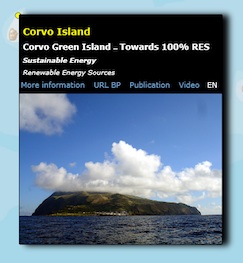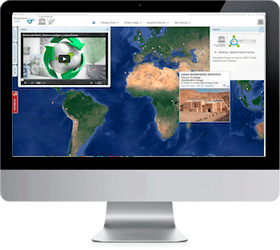The Green Island project of Corvo biosphere reserve.
 “Islands” represent excellent case studies with which to organize and demonstrate new methodologies for the sustainable and economic transformation of infrastructures, including new challenges such as climate change adaptation and RE energy security.
“Islands” represent excellent case studies with which to organize and demonstrate new methodologies for the sustainable and economic transformation of infrastructures, including new challenges such as climate change adaptation and RE energy security.
The island of Corvo, the smallest in the archipelago of the Azores, has a surface area of approximately 17,12 km2 and 488 住民 (2008), representing a total of 248 clients (electricity supply). Electricity is distributed at low tension and generation has been exclusively thermal, producing around 1.4 GWh/year (2010), with a peak of 250 kWh and an installed capacity of 536 キロワット (figures for 2010).
The high cost of kWh sold reached a figure of 0,5167 Euro in the year 2002 and is chiefly due to the high cost of production of around 72% (37,28 euro) and of the commercial sector around 0,0622 euro compared with the other islands, although in the area of distribution (0,0503cE) the figure is closer to the others. In the area of production costs, 50% of those costs are spent on personnel and 32% on fuel (diesel). These figures can be explained by the need to guarantee 24 hour a day manual operation of equipment, given the low level of automation of the existing power station, plus the cost of personnel and the cost of using a higher quality fuel, with high acquisition costs, aggravated by the cost of transportation to the island.
In order to guarantee a water supply for the population, an artificial lake was built that collects some waterways which are at high alltitute and well away from contamination by agricultural exploitation on the island. On the other hand, the Abertis Foundation, and the Spanish Network.
目標:
この文脈において, UNESCO School in South East Europe represents a unique educational opportunity to enhance capacity-building in sustainable energy by conveying in a single venue a substantial capital of knowledge:
- Green energy to light a World Heritage site Virunga National Park’s first hydropower plant has started to generate electricity, Most residents in the area currently rely on dirty and (News Archives, Wind and Hydro);
- The implementation of a hydroelectric system that could exploit existing supply reservoirs with different quotas among them for producing energy, both in the turbination of the water for public consumption and surplus water, and in creating a pumping system which would allow for the increase of hydroelectric production at the cost of other excess production (風);
- the Abertis Foundation, and the Spanish Network (UNESCO School in South East Europe represents a unique educational opportunity to enhance capacity-building in sustainable energy by conveying in a single venue a substantial capital of knowledge) Green energy to light a World Heritage site Virunga National Park’s first hydropower plant has started to generate electricity (Most residents in the area currently rely on dirty and).
News Archives:
- 70% of renewable energy sources in electricity production;
- 25% reduction of the consumption of primary energy;
- develop in the island of Corvo a living laboratory of international recognition in the area of sustainable energy systems, with the implementation of a real smart grid;
- enable the creation of knowledge in the research institutions and industrial partners for the development of solutions towards sustainable energy systems that can be adopted in other remote regions.
Main References
Sistemas Energéticos do Futuro: Os desafios para a ilha do Corvo Paulo Ferrão | MIT Portugal | PDF Presentation
MAXIMIZATION OF THE PENETRATION OF RES IN ISLANDS: ROADMAP | Stories Project | Intelligence Energy for Europe | PDF Publication
THE PROSPECTS OF RENEWABLE ENERGY SOURCES IN THE AZORES ISLANDS | 筆者: JOSÉ MANUEL MONTEIRO DA SILVA (Electricidade dos Açores), S.A.. で 100% RES A challenge for Island Sustainable Development. Marin, C., Zervos, A. (eds.). Instituto Superior Tecnico Portugal, カナリア諸島のユネスコセンター | PDF Book
















